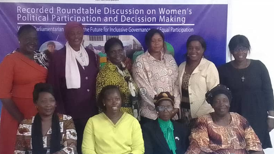Over ten women parliamentarians from various committees and political parties in the National Legislature Women’s Caucus on Thursday took part in a round-table discussion on women’s political participation and decision-making.
The one-day event, organized by the National Press Club South Sudan (NPC-SS) in Juba, aimed to create a space for open and honest dialogue on progress made, existing gaps, and strategies needed to strengthen women’s political engagement ahead of the country’s first elections.
Delphina Roba, the deputy chairperson of the NPC-SS board of directors, urged women lawmakers and policymakers to intensify efforts that promote women’s meaningful participation in political and peacebuilding processes.
Roba, who is also the deputy dean at the School of Journalism, media and Communication Studies (SJMCS) at the University of Juba, noted that the discussion comes at a critical time as South Sudan moves toward elections. She emphasized that the country needs leadership that represents the full potential of its people.
“We meet at a moment when our nation needs us, when our nation needs leadership that reflects the full potential of its people,” she said. “Your presence today is a strong commitment to inclusive governance and sustainable peace.”
She explained that despite global and regional evidence demonstrating the positive impact of women’s participation in political and peace processes, South Sudanese women still face significant barriers such as limited economic opportunities, restricted access to decision-making structures, and entrenched inequalities.
“These barriers weaken our institutions and delay progress,” Roba noted.
She stressed the need for targeted interventions, including leadership training, public speaking, digital literacy, and stronger engagement with the media. Roba encouraged women politicians to embrace digital tools, pointing out that although many women own smartphones, some lack the skills to fully utilize them for political communication and campaigning.
“To be a woman politician, you can also use the media. Most of you have smartphones, but some may lack the skills to use them fully. There are a lot of opportunities,” she said. “We want to see parliamentarians building mentorship and networking with young girls. You have the experience, and you need to share it with emerging female leaders.”
She further highlighted the need for positive media coverage of women in leadership and urged media houses to amplify the achievements and contributions of women politicians. Roba added that women should be trained on using digital platforms for campaigning ahead of the elections, particularly to counter misinformation, online harassment, and hate speech targeting women candidates.
For her part, Julia Onyoti, a human rights defender with the Justice Advisory Group (JAG), said women face numerous challenges, especially during election periods, where societal norms often dictate that a woman’s political participation depends on her husband’s position.
“We have cultural norms, structural barriers, and a lack of political will in implementing the 35 percent [affirmative action], and all these are really limiting the role of women leaders, and even the young leaders who are interested in being part of these political parties,” she highlighted. “How will we prepare as women leaders for the elections? As you know, there are a lot of these cultures; sometimes they tell you that for you to run elections, you must be on the side of your husband.”
As South Sudan prepares for the 2026 general elections, women parliamentarians have raised concerns that many women may not be able to participate meaningfully due to ongoing marginalization and exclusion from political decision-making processes.
They noted that despite the 35 percent quota for women guaranteed under the 2018 peace agreement, significant challenges persist. In many cases, when women are relieved of political positions, their replacements are often men, undermining the purpose of the quota and depriving women of their rightful representation.
Jenty Poni Bullen, parliamentarian at the TNLA, cited lack of finances and insecurity, compounded with the constant obstacles from men, are some of the challenges that may hinder women from participating in the polls.




